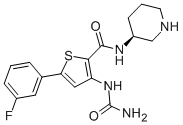
AZD7762 is a potent ATP-competitive checkpoint kinase inhibitor with an IC50 of 5 and <10 nM for CHK1 and CHK2 respectively.AZD7762 has been profiled extensively in vitro andin vivo in combination with DNA-damaging agents and has been shown to potentiate response in several different settings where inhibition of checkpoint kinase results in the abrogation of DNA damage-induced cell cycle arrest.

Sci Rep. 2017 Nov 14;7(1):15511.
Targeting a non-oncogene addiction to the ATR/CHK1 axis for the treatment of small cell lung cancer
AZD7762 purchased from AbMole
| Cell Experiment | |
|---|---|
| Cell lines | H29 cells |
| Preparation method | Checkpoint Abrogation Assay HT29 cells (3 × 105) were seeded in 96-well plates and incubated overnight. Cells were treated for 2 h with camptothecin (topoisomerase I inhibitor; 0.07 μg/mL) to induce the G2 checkpoint. Cells were then treated for 20 h with vehicle (0.5% DMSO) or caffeine (4 mmol/L; positive control) plus nocodazole (1 μg/mL) or a 12-point titration of AZD7762 (12.5 μmol/L to 6 nmol/L) plus nocodazole. Nocodazole alone-treated cells with no camptothecin pretreatment were used to determine the maximum mitotic index. Cells were fixed with 3.7% formaldehyde for 1 h, permeabilized with PBS containing 0.05% Triton X, and incubated with anti-phH3 antibody for 1 h followed by Alexa Fluor 488 anti-rabbit (Molecular Probes) and Hoechst stain for 1 h. Mitotic index was determined on the ArrayScan and expressed as the percentage of cells undergoing mitosis. The EC50 was calculated by concentration-response curve fitting using three-variable logistical equations within XLfit (model 205) with the curve bottom constrained to 0 and the top constrained to 100 by nocodazole alone treatment. |
| Concentrations | 6nM~12.5μM |
| Incubation time | 20 h |
| Animal Experiment | |
|---|---|
| Animal models | athymic mice bearing established H460-DNp53 or SW620 tumors and rnu rats bearing established H460-DNp53 tumors |
| Formulation | formulated in 11.3% hydroxyproplyl-β-cyclodextrin |
| Dosages | 25mg/kg(mouse) and 10 or 20mg/kg (rat) |
| Administration | i.v. injection via the tail vein |
| Molecular Weight | 362.42 |
| Formula | C17H19FN4O2S |
| CAS Number | 860352-01-8 |
| Solubility (25°C) | DMSO 50 mg/mL |
| Storage |
Powder -20°C 3 years ; 4°C 2 years In solvent -80°C 6 months ; -20°C 1 month |
| Species | Mouse | Rat | Rabbit | Guinea pig | Hamster | Dog |
| Weight (kg) | 0.02 | 0.15 | 1.8 | 0.4 | 0.08 | 10 |
| Body Surface Area (m2) | 0.007 | 0.025 | 0.15 | 0.05 | 0.02 | 0.5 |
| Km factor | 3 | 6 | 12 | 8 | 5 | 20 |
| Animal A (mg/kg) = Animal B (mg/kg) multiplied by | Animal B Km |
| Animal A Km |
For example, to modify the dose of Compound A used for a mouse (20 mg/kg) to a dose based on the BSA for a rat, multiply 20 mg/kg by the Km factor for a mouse and then divide by the Km factor for a rat. This calculation results in a rat equivalent dose for Compound A of 10 mg/kg.
| Related Checkpoint Products |
|---|
| CBP501 Affinity Peptide
CBP501 Affinity Peptide is a Chk kinase inhibitor that can abrogate G2 arrest induced by DNA-damaging agents. |
| Chktide
Chktide is a substrate for CHK1 and CHK2. |
| Zn-DPA-maytansinoid conjugate 1
Zn-DPA-maytansinoid conjugate 1 is a small molecule-based maytansinoid conjugate targeting immune checkpoint. |
| CHK1-IN-7
CHK1-IN-7 is a potent human CHK1 inhibitor. |
| Chk2-IN-1
Chk2-IN-1 (compound 1) is a potent and selective inhibitor of checkpoint kinase 2 (Chk2), with IC50s of 13.5 nM and 220.4 nM for Chk2 and Chk1, respectively. Chk2-IN-1 can elicit a strong ataxia telangiectasia mutated (ATM)-dependent Chk2-mediated radioprotection effect. |


Products are for research use only. Not for human use. We do not sell to patients.
© Copyright 2010-2023 AbMole BioScience. All Rights Reserved.
